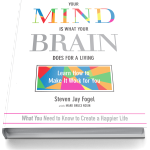My New Book
I’ve received so much positive feedback and so many inspiring comments from readers of Your Mind Is Not Always Your Friend : A Guide for How to Not Get in Your Own Way that I dedicated 2013 to writing a new book, with my coauthor Mark Bruce Rosin. The book is titled Your Mind Is What Your Brain Does for a Living: Learn How to Make It Work for You, and it will be published on March 11, 2014.
These books began as writing projects for myself, to analyze and clarify how I operate, the lessons I’ve learned, and how I can live a more joyous and substantial life. This writing becomes the basis for my books. The two major issues I’m focusing on in my new book are the neuroscience that explains how our mind and brain work and how we can improve our relationships, personal and professional.
As I’ve found in my own life, our ability to achieve our personal and professional goals depends on our individual default programming (the beliefs about ourselves and the world that we developed in childhood), and, if we find our default programming cues us to act in ways that sabotage us, learning how to override it and create new ways of thinking and acting that help us achieve a more happier life.
The purpose of Your Mind Is What Your Brain Does for a Living is to share with you what I’ve learned about how to observe your own programming, identify and let go of self-defeating beliefs, and make mindful choices that will help you create more satisfying relationships and accomplish your career goals.
The word mindful is much in vogue today, but many people are confused about what it means. Being mindful means being in the present, actually experiencing what is happening in the here and now. The opposite of being mindful is being on automatic pilot and responding to a situation in the present with your past-based programmed beliefs and actions. This is what many of us do every day, without even realizing it.
When you respond to the present on automatic pilot, all your old interpretations and judgments come up and control how you perceive the situation and the choices you make – consciously or unconsciously – when you react to it. When you do this, because you are seeing and responding to the present situation from interpretations and judgments you developed from previous situations, you create the present – and the future – to be just like the past. This means that when you react on automatic pilot, if your past has been unsatisfying, your present and future will be too.
When you are engaged mindfully in the present, you let go of these old interpretations and judgments, and are open to experiencing the present as just what it is, and, therefore, responding to the present situation appropriately.
Mindfully letting go of your old interpretations and judgments empowers you to act more productively because when you’re experiencing a new situation as exactly what it is, you are not judging it to be “good” or “bad” or expecting it to turn out like an old situation. This is why being mindful opens you to new possibilities for fulfillment personally and professionally instead of just recreating your past.
I’ve had to learn to become mindful, and everything I’ve learned about mindfulness techniques to develop it and use it is included in Your Mind Is What Your Brain Does for a Living. The reason the title mentions your mind and your brain is that, as I’ve learned, understanding the way that your mind and your brain affect each other is vital to creating the kind of life you want. I’ve spent the last two years researching neuroscientists’ latest findings about our brains, and, as I’ll explain in the book, your brain’s malleability and the connection between your mind and your brain are what give you the ability to “rewire” your brain through mindfulness and to transform yourself and your life, even in personal and professional relationships in which you’ve experienced long-term problems.
When the book comes out in March, I’ll be traveling around the country, doing interviews on radio and television, and speaking engagements, and I hope to meet you. In the meantime, I love sharing my thoughts and experiences with you through my blogs. If you have any thoughts about mindfulness, please let me know.

- 23 Jan, 2014
- Posted by Steve Fogel
- 0 Comments



COMMENTS